How to eat onions correctly: daily consumption rates, benefits and harms, contraindications
Many cuisines around the world use onion - an affordable product with a spicy, original taste. However, this vegetable, which is found in every home, is not as simple as it might seem at first glance. In this article, we will tell you how onions are useful, what harm they can do and how to use them correctly.
The content of the article
How to eat onions correctly
The most beneficial is the use of onions in raw and baked. A boiled, and even more so fried, vegetable loses a lot of vitamin C and other vitamins during the cooking process.
100 g per day is enough to get the right dose vitamins and mineralsthat are contained in this vegetable.
Important. If you have contraindications to the use of onions, the rate of 100 g per day is not suitable for you. Consult your doctor about the possibility and amount of its use in your case.
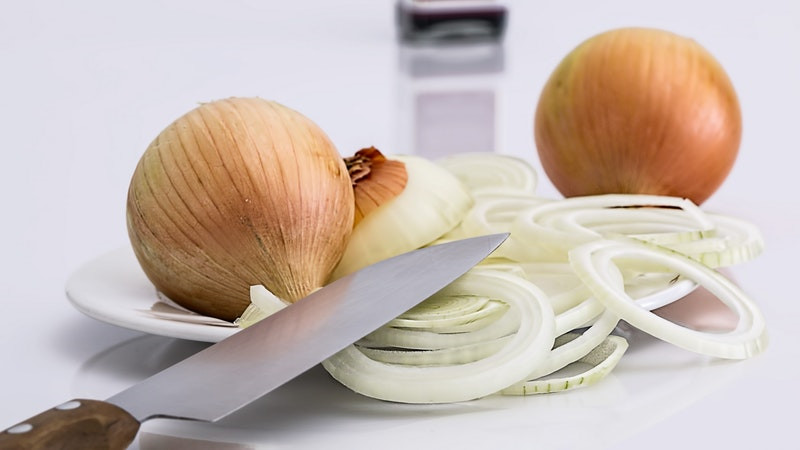
The composition and properties of onions
Onions contain vitamins and microelements useful for the human body:
- Vitamin C. Promotes the production of collagen, with its help blood vessels, bone tissue and skin are renewed. Vitamin C supports immunity, so the body is less prone to seasonal illness.
- Vitamin B1 normalizes metabolism in the body. Supports the nervous system and helps fight depression and stress. Participates in the transfer of genetic information between the cells of the body during their reproduction.
- Vitamin B2 takes part in the synthesis of cells of the nervous system. Provides the formation of red blood cells during the process of hematopoiesis. Helps the adrenal glands work.
- Vitamin B9, or folic acid, helps the protein to be absorbed properly. This vitamin is considered feminine because it increases fertility. Without this vitamin, the formation of human DNA is impossible.
- Vitamin A has a beneficial effect on the immune system, supports the nervous system and the organs of vision. Participates in the formation of bone tissue and the production of hormones, renewal of the skin.
- Vitamin E protects the body from harmful external influences. Helps the absorption of fats and proteins, the formation of the retina. Normalizes the work of the brain. Vitamin E has a beneficial effect on the level of sex hormones; it is advised to take it as a prophylaxis against infertility.
- Vitamin PP normalizes blood sugar and cholesterol levels. It is often prescribed for people with diabetes.
The onion contains a large amount of trace elements: zinc, iron, potassium, manganese, calcium, phosphorus, sodium and magnesium.
Onions are 86% water. 100 g contains 41 kcal, carbohydrates - 10.4 g, proteins - 1.4 g, and there is practically no fat in the composition.
Interesting fact... When a child or an adult falls ill with a cold, the first thing they advise is to eat more onions. The reason is that it contains a special substance - phytoncide, which helps the body to increase immunity during illness.
Benefit and harm
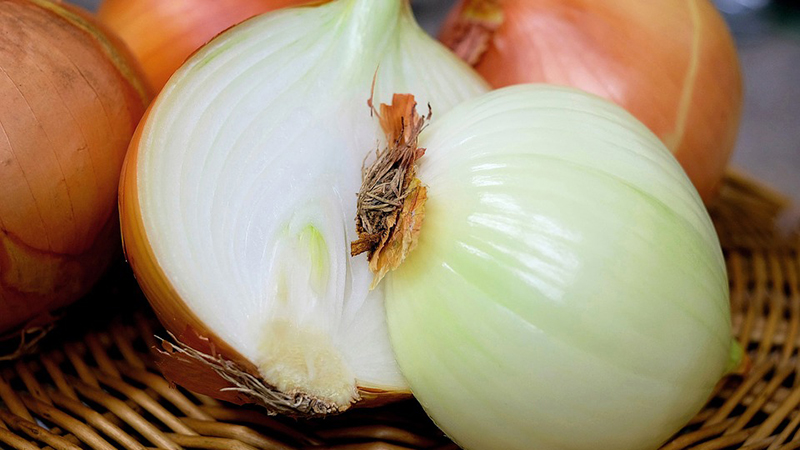
What are the benefits and harms of onions? There are a lot of useful properties in it:
- has an antimicrobial effect;
- lowers blood pressure;
- has a diuretic effect, promotes the outflow of excess fluid from the body;
- has an anthelmintic effect;
- enhances the production of digestive juices;
- regular use helps to increase sex drive.
The main effect of the regular use of onions for men is to increase potency. However, this vegetable does not cure the underlying disease, but helps with taking medications.
Women vegetable is useful for two reasons:
- folic acid is indispensable when planning pregnancy;
- vitamin C has a beneficial effect on the condition of hair, skin and nails.
For pregnant and lactating women, there are pros and cons to eating this vegetable.
Pros:
- Onion fights vitamin deficiency and seasonal decline in immunity. If you are pregnant during the cold season, include a small amount of onions several times a week in your diet.
- Folic acid influences the formation of the fetal neural tube - a vital stage in the first trimester of pregnancy.
- Fight constipation. Pregnant women at different times often suffer from this problem, periodic consumption of onions will help to cope with it.
Harm of onions for pregnant and lactating women:
- Excessive consumption can cause inflammation of the stomach lining. This will provoke gastritis, worsening ulcers, or heartburn.
- Young mothers should remove onions from the diet during breastfeeding - it sharp taste affects the taste of milk, and the baby may refuse it. If you love onions and can't refuse yourself, try eating a small piece and see the baby's reaction within 2-3 days. If there is no change in the child's behavior, add the vegetable to your favorite dishes.
Benefits and harms for children
It is not recommended for children under 3 years old to eat fresh onions. The reason is that the gastric mucosa in young children is immature, and when eating onions increases the risk of gastritis and other diseases of the digestive system.
Important. Heat-treated onions can be introduced into the diet of a child from 8 months of age.
For children over 3 years old, the use of this vegetable is especially useful during the cold season.
Weight Loss Benefits
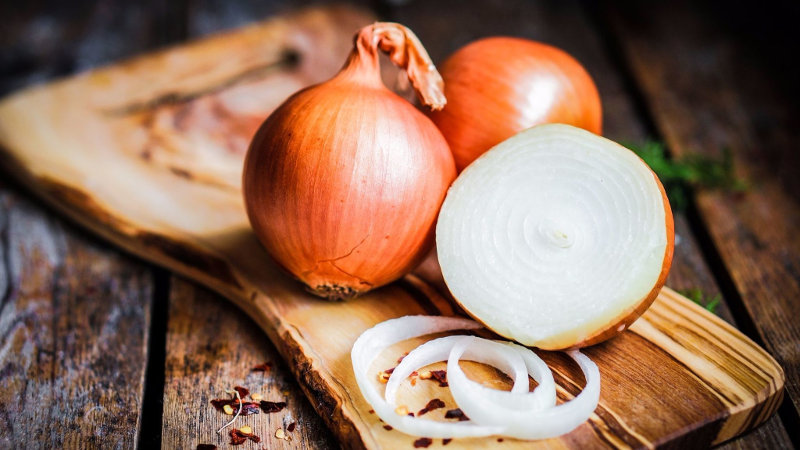
Onions are present in many dietary salads, second and first courses. It is healthy and adds a bright flavor - this is important when you have to adhere to a strict, monotonous diet. However, excess of it during a diet can stop the process of losing weight due to the large amount of carbohydrates.
Council. Eat this vegetable in the morning, then you will benefit your body and not harm your figure.
Influence on organs and body systems
Onions can have a hypnotic effect, have a positive effect on the circulatory system, help metabolism and remove excess fluid from the body. But there is a property in it that can both benefit and harm - it is the fight against microorganisms. On the one hand, it helps fight harmful bacteria, on the other, it can disrupt the intestinal microflora.
Interesting fact. It is thanks to vitamin A, which is contained in onions, that it has such a specific, pungent smell.
This vegetable helps brain activity. With its regular use, the work of the parts of the brain that are responsible for emotions and memory improves. The aging process of brain cells slows down.
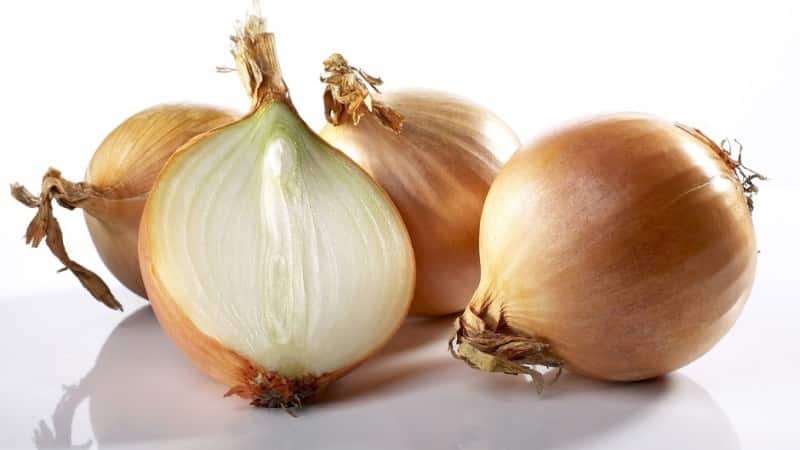
The healing properties of onions for various diseases:
- B vitamins and potassium help the cardiovascular system - include it in the diet if you suffer from hypertension.
- With its help, the liver is cleansed, toxins and toxins accumulated by the body are removed. If you suffer from liver problems, drink plenty of fluids and eat the vegetable fresh.
- When treating osteoporosis, doctors recommend consuming it regularly because of its calcium content, which is easily absorbed.
- For gout and for its prevention, doctors recommend including onions in the diet. It helps remove uric acid from the body by preventing it from being deposited in the joints.
- People with diabetes should increase their intake of onions. It is able to lower blood sugar - this is due to vitamin PP.It is especially important to use it for people who are struggling with high sugar with insulin.
Contraindications
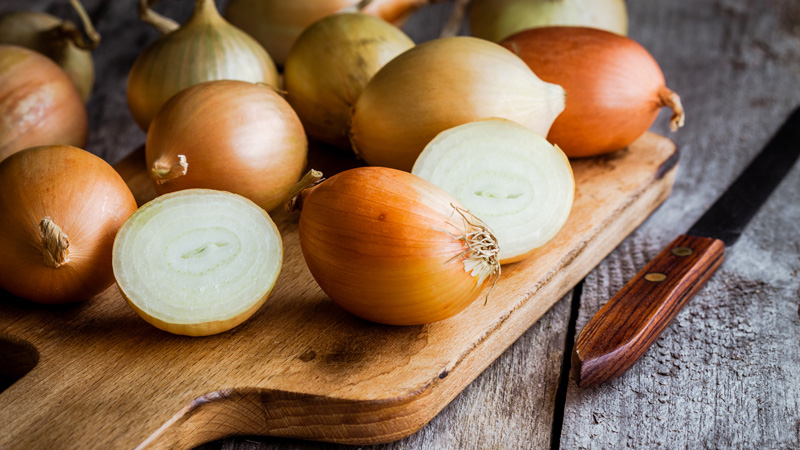
In some cases, onions can be harmful to the body, so you should not use them:
- in diseases of the gastrointestinal tract - onions irritate the mucous membranes of the stomach, which leads to exacerbation or acquisition of gastritis, ulcers;
- pancreatitis - in the acute form of the disease, eating onions can lead to colic, diarrhea and severe bloating.
Conclusion
Onions are a healthy vegetable that contains a huge amount of vitamins and minerals. It helps fight disease and boosts immunity during the cold season in adults and children. If you have no contraindications, include it in your diet, because another plus is its availability for any wallet.